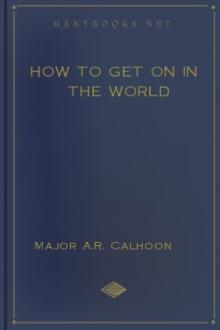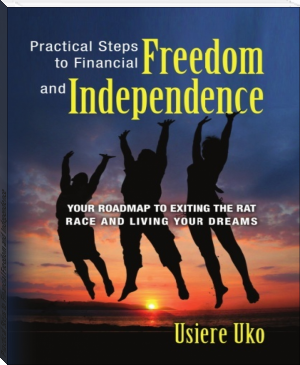How to Get on in the World - Alfred Rochefort Calhoun (bill gates book recommendations TXT) 📗

- Author: Alfred Rochefort Calhoun
- Performer: -
Book online «How to Get on in the World - Alfred Rochefort Calhoun (bill gates book recommendations TXT) 📗». Author Alfred Rochefort Calhoun
Perhaps there is no living man of eminence who so well and forcibly illustrates these qualities of judgment and observation as that greatest of living American inventors, Thomas A. Edison.
Mr. Edison, as we have already stated, had only a few weeks at school in his whole life. He was born in the upper part of New York State in 1847. His parents were poor, and early in life, to use his own expressive words, he "had to start out and hustle." One would think that selling newspapers on a railroad train was not a calling that afforded any educational advantages, but to the man of observation there is no position in life, whether in the busy haunts of men or the silence of the wilderness, that is not replete with valuable information if we but know where to look for it, and have the judgment to use it after it is obtained.
Through the favor of the telegraph operator, whose child's life he had saved when the little one was nearly under the wheels of a train, young Edison was enabled to study telegraphy. During this apprenticeship, if such it may be called, the boy not only learned how to send and receive a message, so as to fit himself for the position of operator, but he learned all about the mechanism and the batteries of the instrument he operated.
"Nothing escaped Tom Edison's observation," said a man who knew him at this time. "He saw everything, and he not only saw it, but he set about learning its whys and wherefores, and he stuck at it till he had learned all there was to be learned about it."
Said another friend, "I've known Edison since he was a boy of fourteen, and of my own knowledge I can say he never spent an idle day in his life. Often when he should have been asleep I have known him to sit up half the night reading. He did not take to novels or wild Western adventures, but read works on mechanics, chemistry and electricity, and he mastered them, too. But in addition to his reading, which he could only indulge at odd hours, he carefully cultivated his wonderful powers of observation, till at length, when he was not actually asleep, it may be said he was learning all the time. Schools and colleges are all very well, but Mr. Edison's career goes to show that a man may become famous, prosperous, and well educated, if he has the necessary capacity for observing and weighing."
Another illustrious example of the same kind is the late George W. Childs, of Philadelphia. He was born in Baltimore, Md., in 1829, and at the age of twelve he had to begin the battle of life by taking the position of errand boy in a book store. "I had no schooling," he said, when speaking of his early struggles, "but I had a quenchless thirst for information. I had no tine to read the books I had to handle and carry sometimes in a wheelbarrow, but I kept my eyes and ears open. I studied the binding and manufacture, though I had not the slightest idea of the contents; and from these early observations I made up my mind that one day I would become a publisher on my own account."
How successfully Mr. Childs did this, we all know. While yet in his teens, he made his way, without money or friends, to Philadelphia, and found a place in a book store, where the same method of education by observation was continued.
The first time he saw a copy of the Philadelphia Ledger, a time when he had scarcely the penny to spare that bought it, he made up his mind that one day he would own that paper—and he carried out his resolution.
So excellent was his judgment that not only publishers, but statesmen and bankers sought it. From the humblest beginnings George W. Childs rose up and up till the greatest men of two continents rejoiced in his friendship, and his name was on the lips of all who admire a noble life devoted to philanthropic deeds.
Our American biographies are full of examples of self-taught men—men who have become educated through observation, and great through good judgment and increasing effort, but there are not many of them that commend themselves so warmly to the heart as the life of the good, wise, and generous George W. Childs.
CHAPTER XIX SINGLENESS OF PURPOSE.We have all heard of the "Jack of all trades, and master of none." Such men never win, though they may excite the admiration of the curious by their impractical versatility.
In early times, even in the early settlement of our own country, it was necessary for not only men, but women also, to be many-sided in their capacity for work; but the world's swift advance has made this unnecessary. A farmer can now buy shoes cheaper than he could make them at home, and the farmer's wife has no longer to learn the art of spinning and weaving.
A French philosopher in speaking of this subject says: "It is well to know something about everything, and everything about something." That is general information is always useful, but special information is essential to special success.
The field of learning is too vast to be carefully gone over in one lifetime, and the business world is too extensive to permit any man to become acquainted with all its topography. A man may do a number of things fairly well, but he can do only one thing very well.
Often versatility instead of being a blessing is an injury. A few men like Michael Angelo in art, Benjamin Franklin in science and letters, and Peter Cooper in various departments of manufacture have succeeded in everything they undertook, but to hold these up as examples to be followed would be to make a rule of an exception.
Singleness of purpose is one of the prime requisites of success. Fortune is jealous, and refuses to be approached from all sides by the same suitor.
We have known men of marked ability, but want of purpose, who studied for the ministry and failed; who then studied law—and failed. After this they tried medicine and journalism, only to fail in each; whereas, had they stuck resolutely to one thing success would not have been uncertain.
A young man may not be able at the very start to hit upon the vocation for which he is best adapted, but should he find it, he will see that his ability to avail himself of its advantages will depend largely on the energy and singleness of purpose displayed in the work for which he had no liking.
There is a famous speech recorded of an old Norseman, thoroughly characteristic of the Teuton. "I believe neither in idols nor demons," said he; "I put my sole trust in my own strength of body and soul." The ancient crest of a pickaxe with the motto of "Either I will find a way or make one," was an expression of the same sturdy independence which to this day distinguishes the descendants of the Northmen. Indeed, nothing could be more characteristic of the Scandinavian mythology, than that it had a god with a hammer. A man's character is seen in small matters; and from even so slight a test as the mode in which a man wields a hammer, his energy may in some measure be inferred. Thus an eminent Frenchman hit off in a single phrase the characteristic quality of the inhabitants of a particular district, in which a friend of his proposed to settle and buy land. "Beware," said he, "of making a purchase there; I know the men of that Department; the pupils who come from it to our veterinary school at Paris do not strike hard upon the anvil; they want energy; and you will not get a satisfactory return on any capital you may invest there."
Hugh Miller said the only school in which he was properly taught was "that world-wide school in which toil and hardship are the severe but noble teachers." He who allows his application to falter, or shirks his work on frivolous pretexts, is on the sure road to ultimate failure. Let any task be undertaken as a thing not possible to be evaded, and it will soon come to be performed with alacrity and cheerfulness. Charles IX of Sweden was a firm believer in the power of will, even in youth. Laying his hand on the head of his youngest son when engaged on a difficult task, he exclaimed, "He shall do it! he shall do it!" The habit of application becomes easy in time, like every other habit. Thus persons with comparatively moderate powers will accomplish much, if they apply themselves wholly and indefatigably to one thing at a time. Fowell Buxton placed his confidence in ordinary means and extraordinary application; realizing the Scriptural injunction, "Whatsoever thy hand findeth to do, do it with thy might;" and he attributed his own success in life to his practice of "being a whole man to one thing at a time."
"Where there is a will there is a way," is an old and true saying. He who resolves upon doing a thing, by that very resolution often scales the barriers to it, and secures its achievement. To think we are able, is almost to be so—to determine upon attainment is frequently attainment itself. Thus, earnest resolution has often seemed to have about it almost a savor of omnipotence. The strength of Suwarrow's character lay in his power of willing, and, like most resolute persons, he preached it up as a system. "You can only half will," he would say to people who failed. Like Richelieu and Napoleon, he would have the word "impossible" banished from the dictionary. "I don't know," "I can't," and "impossible," were words which he detested above all others. "Learn! Do! Try!" he would exclaim. His biographer has said of him, that he furnished a remarkable illustration of what may be effected by the energetic development and exercise of faculties the germs of which at least are in every human heart.
One of Napoleon's favorite maxims was, "The truest wisdom is a resolute determination." His life, beyond most others, vividly showed what a powerful and unscrupulous will could accomplish. He threw his whole force of body and mind direct upon his work. Imbecile rulers and the nations they governed went down before him in succession. He was told that the Alps stood in the way of his armies. "There shall be no Alps," he said, and the road across the Simplon was constructed, through a district formerly almost inaccessible. "Impossible," said he, "is a word only to be found in the dictionary of fools." He was a man who toiled





Comments (0)